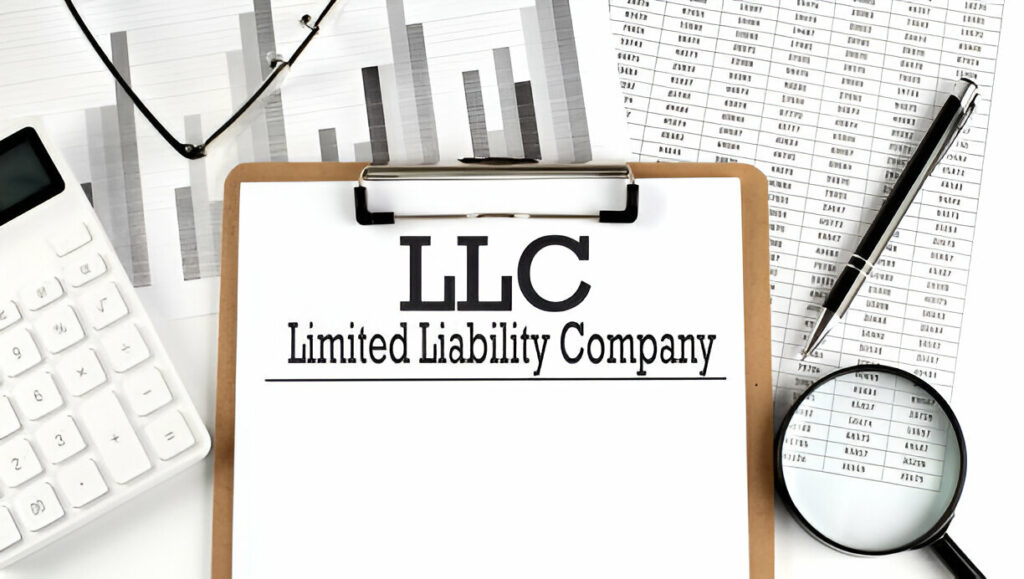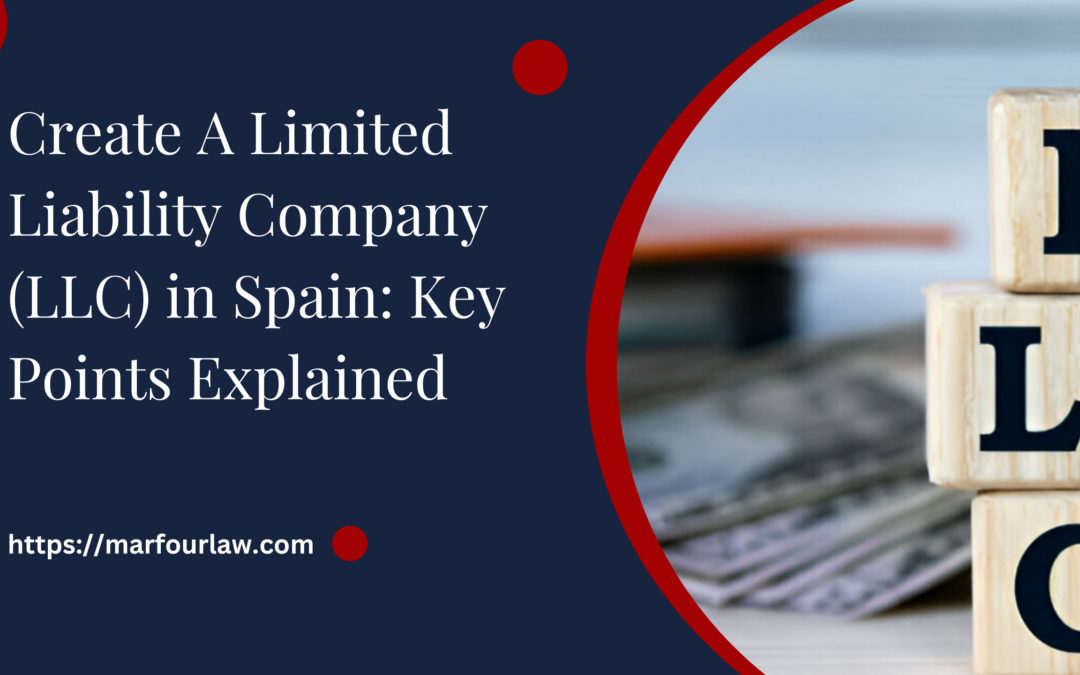Are you considering setting up a Limited Liability Company (LLC) in Spain? It’s a straightforward process that offers significant advantages for entrepreneurs. An LLC España allows you to create a business entity with limited liability, shielding your assets from business debts.
Whether you’re a local entrepreneur or looking to open a company in Spain as a foreign investor, understanding the nuances of business tax in Spain is crucial.
By forming an LLC, you not only gain legal protection but also simplify the administrative requirements compared to other business structures. Let’s delve into what you need to know to get started and reap the benefits of establishing your business presence in Spain.
How to Create a Limited Liability Company (LLC) in Spain?
Creating a Limited Liability Company (LLC) in Spain involves several straightforward steps. Here’s a simplified guide with subheadings:
Initial Planning and Research
Before diving into the process, it’s essential to conduct thorough research and planning. Determine the type of business activities your LLC will engage in and assess the market viability. Consider consulting with a local business advisor or lawyer to understand specific legal requirements and implications for your business in Spain.
Choose Your Company Name
Selecting a unique and appropriate name is crucial. The name must not already be in use by another company in Spain. Ensure it complies with Spanish naming conventions and includes “Sociedad de Responsabilidad Limitada” or its abbreviation “S.L.” at the end, which denotes it as an LLC.
Draft and Notarize Articles of Association
Prepare the Articles of Association (Estatutos Sociales), outlining the company’s purpose, management structure, shareholders’ rights, and other essential details. This document must be notarized before a Spanish notary public.
Deposit Share Capital
LLCs in Spain require a minimum share capital deposit. The amount can vary depending on the nature and scale of your business activities. Ensure the capital is deposited into a Spanish bank account under the company’s name.
Obtain Tax Identification Number (NIF)
Apply for a Tax Identification Number (Número de Identificación Fiscal or NIF) for your LLC from the Spanish Tax Agency (Agencia Tributaria). This number is essential for tax purposes and official transactions in Spain.
Register with the Commercial Registry
Register your LLC with the Commercial Registry (Registro Mercantil) in the province where your company will have its registered office. Submit the notarized Articles of Association, proof of share capital deposit, and other required documentation.
Obtain Business Licenses and Permits
Depending on your business activities, you may need specific licenses or permits to operate legally in Spain. Research and obtain all necessary permits from local authorities or relevant regulatory bodies.
Register for Business Tax
Register your LLC for business tax with the Spanish Tax Agency. This includes registering for Value-Added Tax (VAT), if applicable, corporate income tax, and other taxes based on your business activities.
Set Up Accounting and Reporting Systems
Implement accounting and reporting systems compliant with Spanish regulations. Ensure accurate financial records are maintained, and annual financial statements are prepared and filed appropriately.
Comply with Ongoing Obligations
After establishing your LLC, ensure ongoing compliance with Spanish corporate law, tax obligations, and reporting requirements. Stay informed about any regulatory changes that may affect your business operations.
By following these steps and seeking professional advice where necessary, you can successfully create a Limited Liability Company (LLC) in Spain, position your business for growth, and comply with local laws.
Understanding Business Tax for LLCs in Spain
Understanding business tax for LLCs in Spain is essential for operating your company efficiently and legally. Here’s a clear explanation with subheadings:

Corporate Income Tax
LLCs in Spain are subject to Corporate Income Tax (Impuesto sobre Sociedades). This tax is levied on the company’s worldwide income, including profits from business operations, investments, and capital gains. The standard corporate tax rate in Spain is currently 25%, although reduced rates may apply to certain types of income or small businesses.
Value Added Tax (VAT)
Value Added Tax (Impuesto sobre el Valor Añadido or IVA) applies to most goods and services provided in Spain. As an LLC, you may need to register for VAT if your annual turnover exceeds certain thresholds. VAT rates vary depending on the type of goods or services, with standard rates typically at 21%, reduced rates at 10% or 4%, and exemptions for specific transactions.
Payroll Taxes and Social Security Contributions
If your LLC employs staff in Spain, you must comply with payroll tax obligations. This includes withholding income tax (Impuesto sobre la Renta de las Personas Físicas or IRPF) from employees’ salaries and making social security contributions (Seguridad Social) to cover healthcare, pensions, and other benefits.
Local Business Taxes
Local municipalities in Spain may impose additional taxes on business activities, such as property taxes (Impuesto sobre Bienes Inmuebles or IBI) for office space or business premises. The rates and regulations can vary depending on the location of your business operations.
Annual Accounts and Tax Filings
LLCs in Spain must maintain accurate accounting records and prepare annual financial statements in accordance with Spanish accounting standards. These financial statements are used to calculate and report corporate income tax to the Spanish Tax Agency. Filing deadlines and requirements must be strictly adhered to avoid penalties.
Tax Incentives and Deductions
Spain offers various tax incentives and deductions aimed at promoting business growth and investment. These may include incentives for research and development activities, investments in certain regions, hiring new employees, or contributing to certain social causes. Taking advantage of these incentives can help reduce your LLC’s overall tax burden.
Compliance and Professional Advice
Navigating the complexities of business tax in Spain requires staying informed about changes in tax legislation and maintaining compliance with all regulatory requirements. Seeking advice from tax professionals or legal advisors can provide valuable guidance tailored to your specific business needs and ensure that your LLC operates within the bounds of Spanish tax law.
By understanding and effectively managing your LLC’s tax obligations in Spain, you can optimize financial management, mitigate risks, and support sustainable growth for your business.
Benefits of LLC España for Foreign Investors
Understanding the benefits of an LLC in Spain for foreign investors is crucial for making informed business decisions. Here’s a breakdown with subheadings:
Limited Liability Protection
One of the primary advantages of forming an LLC (Sociedad de Responsabilidad Limitada) in Spain is limited liability protection. This means that the personal assets of foreign investors are generally shielded from the company’s debts and liabilities. In the event of financial difficulties or legal issues, investors’ assets, such as homes or savings, are typically not at risk beyond their investment in the company.
Flexibility in Management
LLCs in Spain offer flexibility in management structures, allowing foreign investors to customize the management of their business according to their preferences and needs. Investors can choose between a sole director or a board of directors, depending on the complexity and size of the business operations.
Access to the European Market
Spain’s strategic location in Europe provides foreign investors with access to the broader European Union market. Operating an LLC in Spain can serve as a gateway to expanding business operations across Europe, benefiting from the EU’s single market advantages, such as the free movement of goods, services, capital, and labor.
Tax Efficiency
LLCs in Spain benefit from a competitive corporate tax rate of 25%, which is lower than in some other European countries. Additionally, Spain offers various tax incentives and deductions that can reduce the overall tax burden for foreign investors. Understanding and optimizing these tax advantages can significantly enhance the profitability and financial sustainability of the LLC.
Business Environment and Infrastructure
Spain boasts a robust business environment with modern infrastructure, a skilled workforce, and supportive legal frameworks. Foreign investors can leverage these advantages to establish and grow their businesses efficiently. The country’s strong banking system and well-developed transportation networks further facilitate smooth business operations.
Cultural and Lifestyle Appeal
Beyond business considerations, Spain’s rich cultural heritage, pleasant climate, and high quality of life make it an attractive destination for foreign investors seeking a favorable work-life balance. The country’s vibrant cities, beautiful landscapes, and diverse culinary offerings create an appealing environment for both business and personal life.
Access to Talent and Innovation
Spain is home to a talented pool of professionals and innovators across various industries, providing foreign investors with access to a skilled workforce and innovative solutions. Collaborating with local talent can enhance the LLC’s competitiveness and innovation capabilities, driving long-term growth and success in the market.
By leveraging these benefits, foreign investors can capitalize on the opportunities offered by an LLC in Spain to establish a successful and sustainable business presence in Europe. Understanding the advantages of an LLC in Spain ensures that investors can make informed decisions that align with their strategic goals and objectives.
Step-by-Step Guide to Open a Company in Spain
Opening a company in Spain involves several clear steps. Here’s a straightforward guide with subheadings:

Initial Planning and Research
Before starting the process, conduct thorough research and planning. Determine the type of company structure that suits your business needs, considering factors like liability protection, tax implications, and management flexibility. Seek advice from local business advisors or lawyers to understand specific requirements and legal obligations.
Choose Your Company Structure
Decide on the most suitable company structure for your business, such as a Limited Liability Company (LLC or Sociedad de Responsabilidad Limitada – S.L.), which offers limited liability protection for shareholders. Ensure your chosen company name is unique and compliant with Spanish naming regulations.
Draft and Notarize Articles of Association
Prepare the Articles of Association (Estatutos Sociales), outlining key details like company objectives, management structure, and shareholder rights. A Spanish notary public must notarize this document to formalize the company’s legal status.
Deposit Share Capital
LLCs in Spain require a minimum share capital deposit, typically €3,000. Transfer this amount into a Spanish bank account in the company’s name and obtain a certificate of deposit from the bank, which will be required during the registration process.
Obtain Tax Identification Number (NIF)
Apply for a Tax Identification Number (Número de Identificación Fiscal or NIF) for your company from the Spanish Tax Agency (Agencia Tributaria). This number is essential for tax purposes and official transactions.
Register with the Commercial Registry
Register your company with the Commercial Registry (Registro Mercantil) in the province where your company will have its registered office. Submit the notarized Articles of Association, proof of share capital deposit, and other required documentation.
Obtain Business Licenses and Permits
Depending on your business activities, obtain any necessary licenses or permits from local authorities or regulatory bodies. This may include municipal licenses, health permits, environmental permits, or specific industry licenses.
Register for Business Tax
Register your company for business tax with the Spanish Tax Agency. This includes registering for Value Added Tax (VAT), if applicable, corporate income tax, and other taxes relevant to your business operations.
Set Up Accounting and Reporting Systems
Implement accounting systems compliant with Spanish regulations to maintain accurate financial records. Prepare annual financial statements in accordance with Spanish accounting standards and file them with the appropriate authorities.
Comply with Ongoing Obligations
Ensure ongoing compliance with Spanish corporate law, tax obligations, and reporting requirements. Stay informed about regulatory changes that may impact your business and fulfill all annual filing and renewal requirements to maintain your company’s legal status.
By following these steps and seeking professional guidance where necessary, you can successfully navigate the process of opening a company in Spain. Understanding each step ensures that you meet all legal requirements and position your business for growth and compliance in the Spanish market.
Legal Requirements for LLCs in Spain
Understanding the legal requirements for LLCs (Limited Liability Companies) in Spain is crucial for ensuring compliance and smooth operations. Here’s a breakdown with subheadings:
Company Structure and Name
LLCs in Spain are known as Sociedad de Responsabilidad Limitada (S.L.). The company name must be unique and comply with Spanish naming conventions. It should include “Sociedad de Responsabilidad Limitada” or its abbreviation “S.L.” at the end to denote its limited liability status.
Share Capital
LLCs in Spain require a minimum share capital deposit, typically set at €3,000. This capital must be deposited into a Spanish bank account in the company’s name before registration. A certificate of deposit from the bank is needed as proof during the registration process.
Articles of Association
The Articles of Association (Estatutos Sociales) outline the company’s purpose, management structure, shareholder rights, and operational procedures. These documents must be drafted and notarized by a Spanish notary public.
Directors and Shareholders
LLCs in Spain can be managed by one or more directors, who may or may not be shareholders. Directors must be individuals of legal age and capacity. Shareholders are required to hold meetings and make decisions based on the company’s articles and applicable legal requirements.
Registered Office
LLCs must have a registered office in Spain, where they can send official communications and legal notices. This address must be declared during the registration process and kept updated with the Commercial Registry.
Registration with the Commercial Registry
LLCs in Spain must be registered with the Commercial Registry (Registro Mercantil) in the province where the company’s registered office is located. The registration process includes submitting the notarized Articles of Association, proof of share capital deposit, and other required documentation.
Tax Registration
LLCs must obtain a Tax Identification Number (Número de Identificación Fiscal or NIF) from the Spanish Tax Agency (Agencia Tributaria) for tax purposes. This number is necessary for filing taxes, complying with tax obligations, and conducting official transactions.
Annual Compliance
LLCs in Spain are required to comply with annual obligations, including filing annual financial statements and holding shareholders’ meetings. Compliance ensures that the company maintains its legal status and meets regulatory requirements.
Regulatory Compliance
LLCs must adhere to Spanish corporate laws, regulations, and industry-specific requirements relevant to their business activities. Staying informed about regulatory changes and fulfilling all legal obligations is essential to avoid penalties and maintain good standing.
Understanding these legal requirements for LLCs in Spain ensures that foreign investors and entrepreneurs can establish and operate their businesses effectively within the framework of Spanish law. Seeking professional advice from local experts can provide valuable guidance tailored to specific business needs and regulatory compliance.
Tax Advantages of Forming an LLC in Spain
Understanding the tax advantages of forming an LLC (Limited Liability Company) in Spain is essential for maximizing profitability and financial efficiency. Here’s a breakdown with subheadings:

Competitive Corporate Income Tax Rate
LLCs in Spain benefit from a competitive corporate income tax rate of 25% on taxable profits. This rate applies to the company’s worldwide income, including earnings from business operations, investments, and capital gains. Compared to other European countries, Spain’s corporate tax rate is relatively moderate, which can help reduce the overall tax burden for businesses.
Tax Deductions and Incentives
Spain offers various tax deductions and incentives aimed at promoting business growth and investment. These may include deductions for research and development (R&D) activities, investments in certain regions or industries, and hiring new employees. Taking advantage of these deductions can significantly reduce the taxable income of an LLC, thereby lowering its corporate tax liability.
Dividend Participation Exemption
LLCs in Spain may benefit from the dividend participation exemption, which provides a partial or full exemption from taxation on dividends received from subsidiaries or affiliated companies. This exemption encourages reinvestment of profits within the group and facilitates efficient cash flow management.
Double Taxation Treaties
Spain has an extensive network of double taxation treaties with numerous countries worldwide. These treaties aim to prevent the same income from being taxed twice (once in Spain and again in the investor’s home country), thereby avoiding double taxation and promoting cross-border investment.
Value Added Tax (VAT) Benefits
LLCs registered for VAT in Spain can reclaim VAT paid on business expenses and purchases (input VAT), offsetting it against VAT collected on sales (output VAT). This mechanism reduces the effective VAT burden on businesses and improves cash flow management.
Asset Depreciation and Amortization
LLCs in Spain can benefit from tax deductions related to asset depreciation and amortization. These deductions allow businesses to gradually write off the cost of acquiring assets, such as machinery, equipment, and intangible assets, over their useful life. This reduces taxable income and lowers the corporate tax liability.
Patents and Intellectual Property Benefits
LLCs engaged in innovative activities may benefit from tax incentives related to patents and intellectual property (IP). Spain offers reduced tax rates or tax credits for income generated from IP assets, encouraging investment in research, development, and innovation.
These tax advantages make forming an LLC in Spain an attractive option for foreign investors and entrepreneurs looking to establish and grow their businesses while optimizing their tax liabilities in a business-friendly environment.
Why Choose an LLC Structure in Spain?
Choosing an LLC structure in Spain combines legal protection, management flexibility, tax advantages, and market access, making it a preferred option for foreign investors and entrepreneurs looking to establish a secure and efficient business presence in Spain and beyond.
Limited Liability Protection
An LLC (Sociedad de Responsabilidad Limitada) in Spain offers limited liability protection to its shareholders. This means that shareholders’ personal assets are generally protected from the company’s debts and liabilities. If the LLC faces financial difficulties or legal claims, shareholders are typically only liable for their investment in the company, reducing personal financial risk.
Flexibility in Management
LLCs in Spain provide flexibility in management. Shareholders can choose between a single director or a board of directors to oversee business operations. This flexibility allows for adapting management structures according to the size and complexity of the business, enabling efficient decision-making and operational management.
Ease of Formation and Administration
Forming an LLC in Spain is relatively straightforward compared to other business structures. The process involves drafting and notarizing the Articles of Association, depositing the minimum share capital, and registering with the Commercial Registry. Once established, LLCs have fewer administrative requirements and reporting obligations compared to larger corporations, making them easier to manage and maintain.
Tax Efficiency
LLCs in Spain benefit from favorable business tax rates and incentives. The corporate income tax rate is competitive at 25%, and there are various deductions and exemptions available for eligible expenses, such as research and development activities or investments in certain sectors. These tax advantages can help optimize the LLC’s financial management and reduce overall tax liabilities.
Credibility and Business Reputation
Choosing an LLC structure in Spain can enhance your business’s credibility and reputation. LLCs are recognized as legitimate and established entities in the Spanish business community, which can attract investors, partners, and clients. Having a formalized business structure also demonstrates a commitment to legal compliance and professionalism, fostering trust among stakeholders.
Continuity and Succession Planning
LLCs in Spain offer continuity and flexibility in terms of ownership and management succession. Shareholders can transfer ownership through the sale of shares or inheritance, ensuring business continuity without disrupting operations. This flexibility makes LLCs an ideal choice for long-term business planning and succession strategies.
Access to the European Market
Spain’s strategic location within the European Union provides access to the broader European market. Establishing an LLC in Spain can serve as a gateway to expand business operations across EU countries, benefiting from the EU’s single market advantages, such as the free movement of goods, services, capital, and labor.
Essential Steps to Establishing an LLC in Spain
Establishing an LLC (Limited Liability Company) in Spain involves several essential steps. Here’s a straightforward guide with subheadings:

Initial Planning and Research
Before proceeding, conduct thorough research and planning. Determine the type of LLC structure that best suits your business goals and objectives. Consider factors such as liability protection, tax implications, and management flexibility. Seek advice from local legal and business experts to understand specific requirements and legal obligations.
Drafting Articles of Association
Prepare the Articles of Association (Estatutos Sociales), which outline key details about the LLC, including its purpose, management structure, shareholder rights, and operational procedures. These articles must be drafted according to Spanish legal standards and notarized by a Spanish notary public to formalize the LLC’s legal status.
Deposit Minimum Share Capital
LLCs in Spain require a minimum share capital deposit, typically amounting to €3,000. Transfer this capital into a Spanish bank account in the LLC’s name and obtain a certificate of deposit from the bank. This proof of deposit is necessary for the registration process.
Obtain Tax Identification Number (NIF)
Apply for a Tax Identification Number (Número de Identificación Fiscal or NIF) for the LLC from the Spanish Tax Agency (Agencia Tributaria). This number is essential for tax purposes, official transactions, and communication with government authorities.
Register with the Commercial Registry
Register the LLC with the Commercial Registry (Registro Mercantil) in the province where the company will have its registered office. Submit the notarized Articles of Association, proof of share capital deposit, and other required documentation as per local regulations.
Obtain Business Licenses and Permits
Depending on the nature of your business activities, obtain any necessary licenses or permits from local authorities or regulatory bodies. These may include municipal licenses, health permits, environmental permits, or specific industry licenses required to operate the LLC legally in Spain.
Register for Business Tax
Register the LLC for business tax with the Spanish Tax Agency. This includes registering for Value-Added Tax (VAT), if applicable, corporate income tax, and other taxes relevant to the LLC’s business activities.
Set Up Accounting and Reporting Systems
Implement accounting systems compliant with Spanish regulations to maintain accurate financial records. Prepare annual financial statements in accordance with Spanish accounting standards and file them with the appropriate authorities.
Comply with Ongoing Obligations
Ensure ongoing compliance with Spanish corporate law, tax obligations, and reporting requirements. Stay informed about regulatory changes that may affect the LLC’s operations and fulfill all annual filing and renewal requirements to maintain the LLC’s legal status.
By following these essential steps and seeking professional guidance where necessary, you can successfully establish an LLC in Spain. Understanding each step ensures that you meet all legal requirements and position your business for growth and compliance in the Spanish market.
FAQs
Here are some frequently asked questions (FAQs) about forming an LLC (Limited Liability Company) in Spain.
What is the minimum share capital required to establish an LLC in Spain?
The minimum share capital required for an LLC in Spain is typically €3,000. This amount must be deposited into a Spanish bank account in the company’s name before registration.
Can foreign nationals or non-residents establish an LLC in Spain?
Yes, foreign nationals and non-residents can establish an LLC in Spain. They need to appoint a local representative and obtain a Tax Identification Number (NIF) from the Spanish Tax Agency.
What are the main tax advantages of forming an LLC in Spain?
The main tax advantages include a competitive corporate income tax rate of 25%, various tax deductions and incentives for business activities, and benefits under Spain’s double taxation treaties with other countries.
How long does it take to register an LLC in Spain?
The registration process typically takes a few weeks to complete, depending on the efficiency of document preparation, notarization, and submission to the Commercial Registry.
What are the ongoing compliance requirements for an LLC in Spain?
Ongoing compliance includes filing annual financial statements, maintaining accounting records, fulfilling tax obligations, and renewing business licenses and permits as required.
Conclusion
Forming an LLC (Sociedad de Responsabilidad Limitada) in Spain offers numerous benefits, including limited liability protection, tax advantages, and flexibility in management and operations.
By following the essential steps outlined, entrepreneurs and investors can establish a secure and legally compliant business presence in Spain. Seeking guidance from local legal and business experts can streamline the process and ensure adherence to Spanish regulatory requirements.
With its strategic location in Europe and favorable business environment, Spain remains an attractive destination for foreign investment and business expansion.

